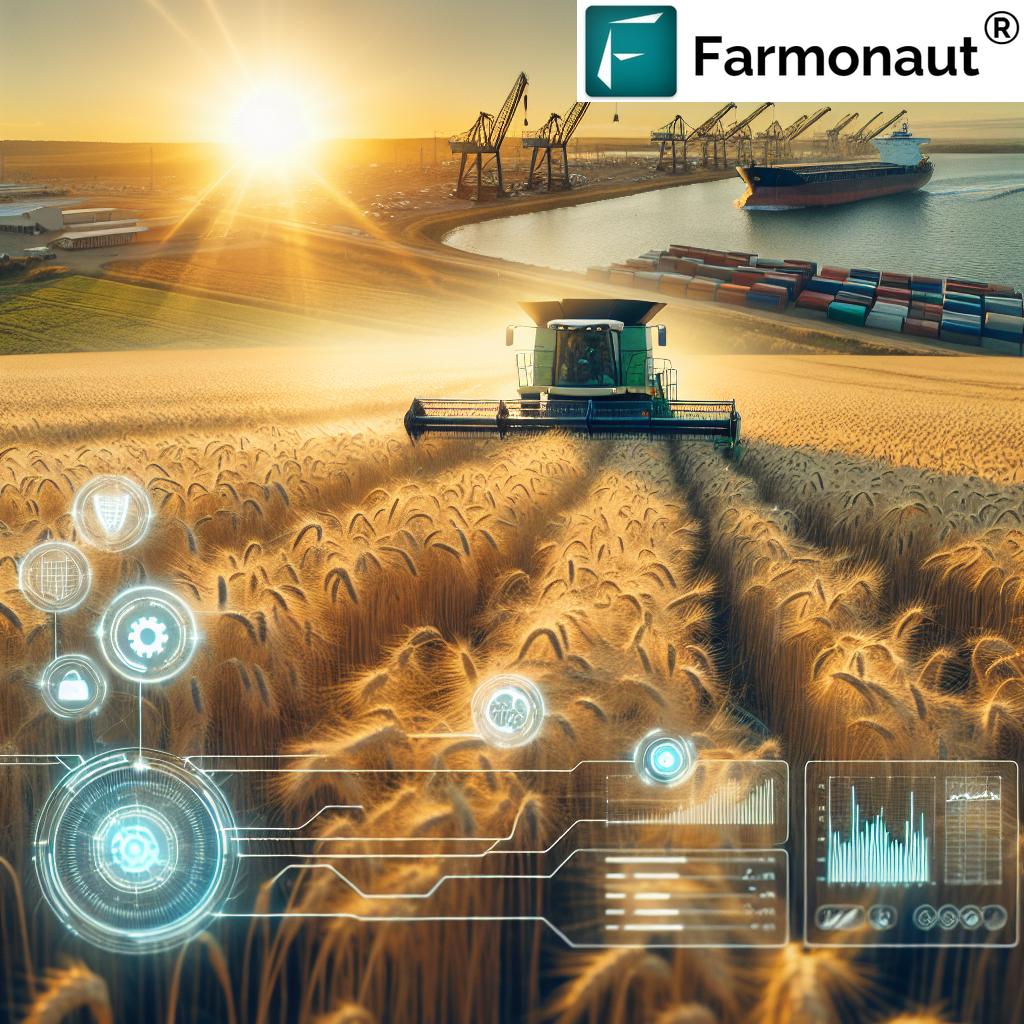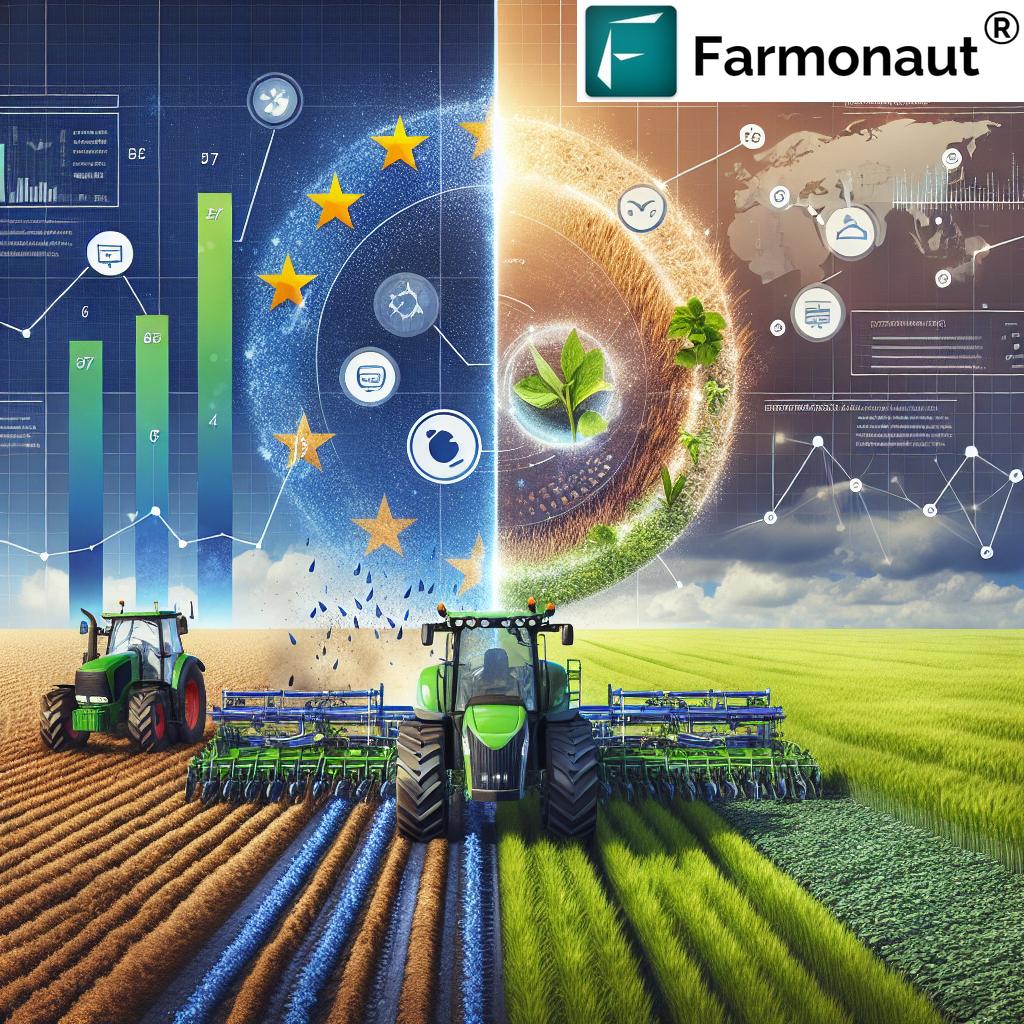Unlocking Sustainable Profitability: Australian Grain Industry’s Path to Global Market Access through EU Free Trade Agreement

“Australian grain industry could potentially access a market of 450 million consumers through the EU Free Trade Agreement.”
In the ever-evolving landscape of global agriculture, we find ourselves at a pivotal moment for the Australian grain industry. The recent EU Free Trade Agreement inquiry has shed light on the immense potential for sustainable agriculture practices and innovative grain market access strategies. As we delve into this comprehensive analysis, we’ll explore how this agreement could revolutionize crop yields, enhance profitability, and pave the way for a more sustainable future in farming.
The EU Free Trade Agreement: A Game-Changer for Australian Grain
The European Union (EU) Free Trade Agreement represents a significant opportunity for Australian grain growers to expand their reach and tap into a vast market of discerning consumers. This agreement is not just about opening doors; it’s about building bridges to sustainable profitability and environmental stewardship.
- Enhanced market access for Australian grain products
- Reduced tariffs and trade barriers
- Alignment with EU sustainability standards
- Opportunities for knowledge exchange and innovation
As we navigate this new terrain, it’s crucial to understand the potential impact on our industry and how we can leverage this agreement to our advantage. Let’s explore the key aspects that will shape the future of Australian grain in the global market.
Sustainable Agriculture Practices: The Cornerstone of Future Success
At the heart of the EU Free Trade Agreement lies a commitment to sustainable agriculture. This aligns perfectly with the growing global demand for environmentally conscious farming methods. As Australian grain producers, we must embrace these practices not only to meet EU standards but also to ensure the long-term viability of our industry.
Key sustainable practices include:
- Conservation tillage to improve soil health
- Precision agriculture for optimal resource use
- Integrated pest management to reduce chemical inputs
- Crop rotation for improved soil fertility and pest control
By adopting these methods, we can significantly reduce our environmental footprint while improving crop yields and quality. This dual benefit is crucial for maintaining competitiveness in the global market.
Innovative Farming Technologies: Revolutionizing Crop Yields
To fully capitalize on the opportunities presented by the EU Free Trade Agreement, we must embrace innovative farming technologies. These advancements are key to improving crop yields, reducing costs, and meeting the stringent quality standards of the European market.
Farmonaut, a leading agricultural technology company, offers advanced satellite-based farm management solutions that can revolutionize how we monitor and manage our crops. Their platform provides real-time crop health monitoring, AI-based advisory systems, and resource management tools, all of which are essential for modern, efficient farming.
Benefits of adopting agritech solutions:
- Real-time crop health monitoring for timely interventions
- Precision application of inputs, reducing waste and environmental impact
- Data-driven decision making for improved crop management
- Enhanced traceability to meet EU market requirements
By leveraging these technologies, Australian grain producers can optimize their operations, increase yields, and produce crops that meet the high standards required for EU market access.
Global Agricultural Trade Policies: Navigating the Complexities
Understanding and adapting to global agricultural trade policies is crucial for Australian grain producers looking to expand their presence in the EU market. The Free Trade Agreement brings with it a new set of regulations and opportunities that we must carefully navigate.
Key considerations in global trade policies:
- Compliance with EU food safety and quality standards
- Understanding and meeting sustainability certification requirements
- Navigating complex tariff structures and quota systems
- Adapting to changing consumer preferences in the EU market
By staying informed and proactive in addressing these policy challenges, we can position ourselves as reliable and preferred suppliers to the European market.
Explore Farmonaut’s API for advanced agricultural insights
International Grain Market Analysis: Seizing Opportunities
A thorough understanding of the international grain market is essential for Australian producers to make informed decisions and capitalize on new opportunities arising from the EU Free Trade Agreement.
| Sustainability Metric | Pre-FTA Status | Post-FTA Projection | Global Benchmark |
|---|---|---|---|
| Carbon Footprint (CO2e/tonne) | 0.5 | 0.4 | 0.45 |
| Water Use Efficiency (L/kg grain) | 1000 | 800 | 900 |
| Soil Health Index | 6.5 | 7.5 | 7.0 |
| Biodiversity Score | 65 | 75 | 70 |
| Sustainable Farming Practices Adoption (%) | 60% | 80% | 70% |
| Crop Yield (tonnes/hectare) | 2.5 | 3.0 | 2.8 |
| Market Access (% of global grain trade) | 5% | 8% | 6% |
This table illustrates the potential improvements in sustainability metrics and market access that could result from the implementation of the EU Free Trade Agreement. It’s clear that by focusing on sustainable practices, we can not only meet global benchmarks but also exceed them in many areas.
“Sustainable agriculture practices can increase crop yields by up to 30% while reducing environmental impact.”
Sustainable Grain Production Methods: A Competitive Edge
Adopting sustainable grain production methods is no longer just an ethical choice; it’s a competitive necessity in the global market, especially when targeting environmentally conscious EU consumers.
Farmonaut’s satellite-based crop health monitoring system can play a crucial role in implementing and maintaining sustainable production methods. By providing real-time data on crop health, soil moisture, and other critical metrics, farmers can make informed decisions that optimize resource use and minimize environmental impact.
Key sustainable production methods:
- Precision agriculture for targeted input application
- Cover cropping to improve soil health and reduce erosion
- Water-efficient irrigation systems
- Use of biological pest control methods
These methods not only align with EU sustainability standards but also contribute to long-term soil health and productivity, ensuring the sustainability of our industry for generations to come.
Access Farmonaut’s API Developer Docs for integration insights
Agricultural Profitability Solutions: Balancing Economics and Sustainability
While sustainability is crucial, it must go hand in hand with profitability to ensure the long-term viability of Australian grain farms. The EU Free Trade Agreement offers new avenues for increasing profitability, but it requires strategic planning and investment in the right technologies and practices.
Strategies for enhancing profitability:
- Diversification of crop portfolios to meet varied EU market demands
- Investment in value-added processing to capture higher margins
- Adoption of cost-saving technologies like Farmonaut’s AI advisory system
- Participation in carbon credit schemes for additional revenue streams
By implementing these strategies, Australian grain producers can create a sustainable business model that thrives in the competitive global market while meeting the stringent requirements of the EU.
Overcoming Economic Barriers: Strategies for Success
The EU Free Trade Agreement presents opportunities, but it also comes with challenges. Australian grain producers must be prepared to overcome various economic barriers to fully benefit from this new market access.
Key strategies for overcoming barriers:
- Investing in quality assurance systems to meet EU standards
- Developing strong logistics and supply chain networks
- Building partnerships with EU distributors and retailers
- Leveraging technology for efficient production and traceability
Farmonaut’s blockchain-based traceability solution can be particularly valuable in this context, providing the transparency and security required by EU consumers and regulators.
Collective Efforts Towards Sustainability: Industry-Wide Initiatives
The journey towards sustainable and profitable grain production under the EU Free Trade Agreement is not one that individual farmers can undertake alone. It requires collective efforts and industry-wide initiatives to create meaningful change and meet the challenges ahead.
Key areas for collective action:
- Developing industry-wide sustainability standards
- Investing in research and development for sustainable farming practices
- Creating knowledge-sharing platforms for best practices
- Lobbying for supportive policies and infrastructure development
By working together, we can create a stronger, more resilient grain industry that is well-positioned to thrive in the global market.
The Role of Technology in Sustainable Grain Production
As we look to the future of sustainable grain production under the EU Free Trade Agreement, technology will play an increasingly crucial role. Farmonaut’s suite of tools, including satellite-based crop monitoring and AI-driven advisory systems, exemplifies the kind of technological solutions that can drive our industry forward.
Key technological advancements:
- Remote sensing for early detection of crop stress and disease
- Predictive analytics for optimized planting and harvesting schedules
- Automated irrigation systems for water conservation
- Blockchain technology for transparent supply chain management
By embracing these technologies, Australian grain producers can not only meet the sustainability requirements of the EU market but also lead the way in innovative and efficient farming practices globally.
Conclusion: A Sustainable and Profitable Future for Australian Grain
The EU Free Trade Agreement presents a unique opportunity for the Australian grain industry to evolve, innovate, and thrive in the global market. By focusing on sustainable agriculture practices, leveraging innovative technologies, and working collectively towards common goals, we can unlock new levels of profitability while ensuring the long-term health of our land and communities.
As we move forward, let’s embrace the challenges and opportunities that lie ahead, knowing that with the right tools, strategies, and collective effort, the Australian grain industry is poised for a bright and sustainable future in the global marketplace.

FAQ Section
Q: How will the EU Free Trade Agreement benefit Australian grain producers?
A: The agreement will provide enhanced market access, reduced tariffs, and opportunities for Australian grain producers to tap into a market of 450 million consumers, while promoting sustainable farming practices.
Q: What are some key sustainable agriculture practices for grain production?
A: Key practices include conservation tillage, precision agriculture, integrated pest management, and crop rotation, all of which can improve soil health, reduce environmental impact, and increase crop yields.
Q: How can technology like Farmonaut’s platform help in meeting EU sustainability standards?
A: Farmonaut’s satellite-based crop monitoring and AI advisory systems can help farmers optimize resource use, reduce environmental impact, and provide the traceability required by EU markets, all contributing to meeting sustainability standards.
Q: What economic barriers might Australian grain producers face in accessing the EU market?
A: Potential barriers include meeting strict quality and safety standards, navigating complex regulations, adapting to different consumer preferences, and developing efficient supply chains for the European market.
Q: How can the Australian grain industry collectively work towards sustainability?
A: The industry can collaborate on developing sustainability standards, investing in research and development, creating knowledge-sharing platforms, and advocating for supportive policies to drive sustainable practices across the sector.






